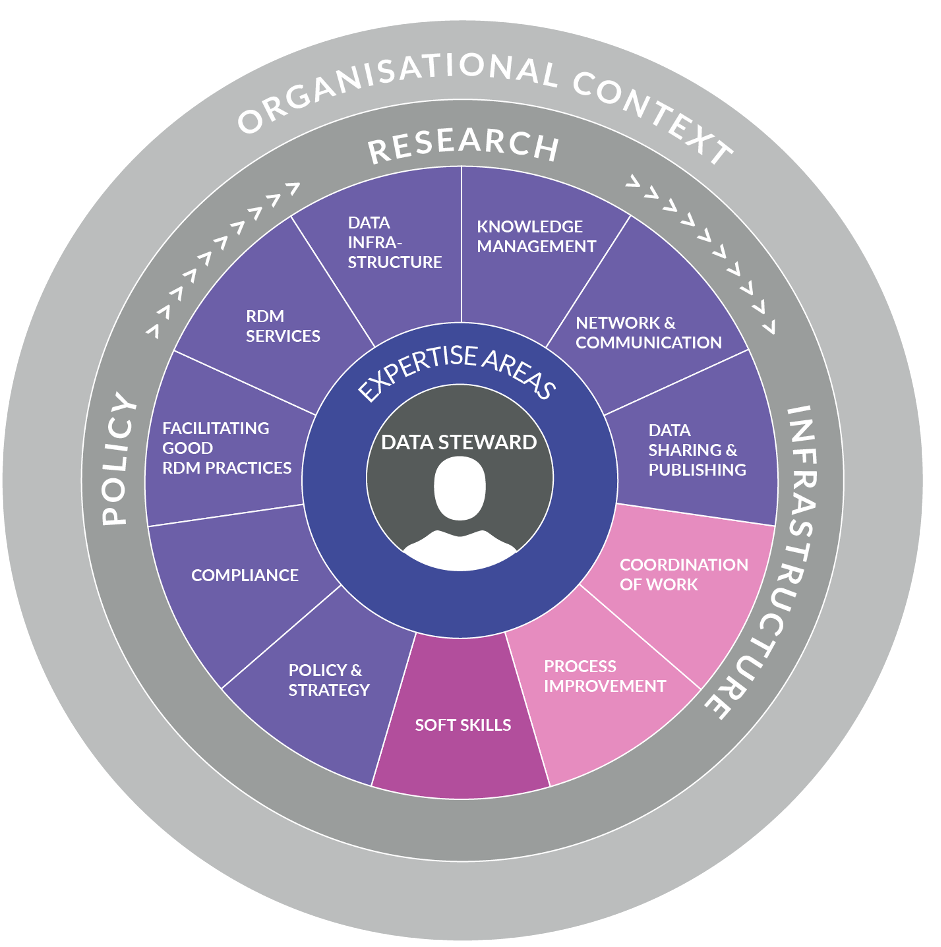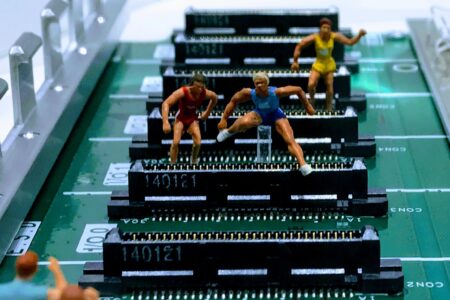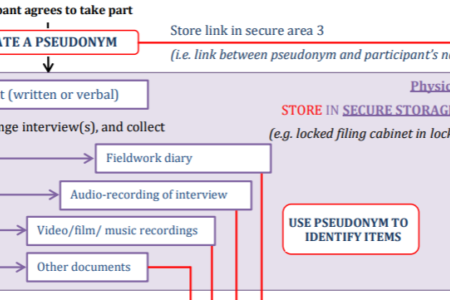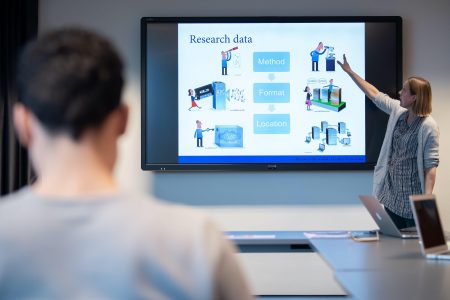Leiden University Data Stewards Day 2022
Who are Leiden University Data Stewards? On 30 June 2022, we held our first Data Stewardship Day: bringing together first-line and second-line research data management support staff to get to know each other and learn more about RDM-related developments taking place at Leiden University and beyond.
Up to 2021, support for research data management across Leiden University was mainly concentrated in the Centre for Digital Scholarship, part of the University Libraries. Since 2021, however, the university has been expanding its levels of RDM staffing, resulting in the appointment of a number of new 'embedded' Data Stewards, who work more closely with researchers within the faculties and institutes, and in the expansion of the central staff support.
Through the Leiden Research Support programme, plans to coordinate new lines of research support through first line (embedded) and second line (central support and coordination) teams have been discussed and are being developed. The Data Management Network is one of the ways in which coordination is being addressed and projects are underway to develop improved knowledge management and communication processes. Members of the Data Management Network discussed how the different roles of first and second line support would look at the December 2021 online event Connect and Build: the future of data stewards at Leiden University.
On the 30th of June 2022, first-line RDM support staff, embedded in the faculties, and second-line in the central services, came together for the first time and devoted a whole day to learning more about their respective roles in the context of this wider environment, and to further discuss how they would work together. By combining a mix of learning, listening, exchanging, and working, the day was of great interest and benefit for participants.
AGENDA
1 hour What kind of data steward are you?
45 mins Leiden DCC, infrastructure, and support
Lunch and networking
30 mins Highlighting the existence and impact of RDM support
30 mins Who is your community? Part 1
45 mins Who is your community? Part 2: What do they need?
45 mins Faculty Data Protocols
Roundup
Informal social drinks
What kind of data steward are you?
Leiden staff can consult the Universiteiten van Nederland (UNL, formerly VSNU) Job Classification website through a special university login (details on the staff web pages) and see the UFO (Universitair Functieordeningssysteem) profiles defined for different kinds of university jobs.
We looked together at the Data Steward definition which describes the goal as being “To develop and advise on Research Data Management (RDM) services and products, as well as to monitor research data, within set legislation and regulations in order to ensure efficient research data management, foster reproducibility and encourage re-use”
The profile defines the likely context under which a Data Steward works: to whom a Data Steward reports or from whom they receive instructions, and then describes in detail the activities in which they might be involved and results that might be achieved. These fall under the following areas:
- Policy development
- (Continuous) development of RDM services and products
- Advice and information
- Knowledge development, and quality and process improvement
- Coordination of work
Four different grading levels then indicate the minimum expectations, and upon returning to the job level matrix on the Leiden website, you can read how these gradings correspond to different salary scales.
The UFO Data Steward profiles were approved and implemented during 2021 and early 2022, so some of our Data Stewards may not have been classified on these job descriptions when their employment at Leiden began. An individual’s classification can easily be changed, but more importantly, the activity and grading levels can give a sense of how a role and person might develop and evolve in their position.
The UFO profile was produced as an output of the NPOS project “Professionalizing Data Stewardship”. The lengthy final report of that project also proposes the development of a skills tool to help data stewards assess their strengths and identify areas they might develop, which would link to a training tool to identify appropriate training or development opportunities. The first effort in making such a tool can be viewed on the EBI competency hub and there are ongoing efforts to build a training catalogue.
During our meeting we discussed where we felt our current strengths and weaknesses lay on the skills wheel (see below) and whether there was training we could organise in-house to address any of our current weaknesses.

We discussed what activities first and second line staff were performing that fell under these different expertise areas, and the differences in our roles. We also identified some areas where perhaps we are not doing as much, for example, in knowledge management we are still building our levels of knowledge but there are plans to better share knowledge and be better prepared to handle more complex questions that arise; and in the area of data sharing and publishing, we could organise hands-on help sessions during the year to better support researchers. When it comes to developing data infrastructure and RDM services, if we can work together and and speak with one voice, then we can maybe make change happen more quickly.
The topic of training and skills development is one we’ll discuss again in future to make sure we're keeping up with the demands of our various roles as they evolve and develop.
Leiden is also part of the Dutch Recognition and Rewards Programme, which acknowledges that research is performed as part of a team and gives attention to the role of support staff in research.
The university and national context
Laurents Sesink, Head of the Centre for Digital Scholarship and one of the coordinators of the Leiden Digital Competency Centre (LDCC) took over for the next part of the agenda and presented to the group the context of the LDCC: the reasons for setting up a Dutch national DCC network, and the purpose of a local DCC, to bundle expertise in the field of FAIR Data Stewardship, software and computing.
On behalf of the Ministry of Education, Culture and Science, the Dutch funder NWO is realising several activities in the area of digital research infrastructure. Two of the funding lines within this programme are the setting up of local DCCs and of thematic DCCs (TDCCs).
To initiate local DCCs, as a first step, NWO has funded the recruitment of either a data manager or data steward or a research software manager at every organisation. At Leiden we have appointed 1.5 FTEs in the Centre of Digital Scholarship to help with data and software management.
The Leiden (local) DCC will provide for:
- Integrated support for training, tooling and policy for the complete research data cycle;
- Cooperation between data management, research ICT, information security & privacy and ethics;
- Three networks: data stewards, research software engineers, and research-ICT;
- Cooperation with:
Local DCCs will deal with FAIR data, sustainable software (an area new for most organisations), and research ICT at a central level (which was previously normally handled at faculty level).
Laurents explained the governance at Leiden, plans for capacity building, and the activities planned for 2022 and beyond. When it comes to data management these include the development of faculty data protocols, the monitoring and registration of datasets, FAIR YODA for Communities, appointment of faculty data stewards, and a DMP tool. In the area of software there is a need to recruit research software engineers at Leiden faculties, to professionalize this domain perhaps with UFO profiles as for data stewards, and to develop university policy. Research ICT also needs building up with new recruitments and professionalisation, and there needs to be improved connection with the researchers.
The LDCC will be virtual with no physical office location. Members of the LDCC are from the Centre for Digital Scholarship (CDS), the Research ICT Competence Centre (RICC), and the Directorate of Strategy and Academic Affairs (SAZ).
In the other funding line, NWO stimulates Thematic Digital Competency Centres (TDCCs) in three clusters (Social Sciences and Humanities, Science and Technology, and Life Sciences and Health) to help avoid fragmentation of resources and initiatives nationally, and steer towards cooperation and self-organization between existing organizations within the various domains.
Each TDCC has a roadmap for its own priorities, and overarching topics, such as training, will be collaboration areas. Two cluster managers will be recruited in January 2023 for coordinating activities.
We all appreciated this overview of the DCC plans which puts our work into context, and gives a glimpse of where we are heading in terms of coordination at the local and national level. Jacko Koster, who had joined us virtually for this part of the day, added an explanation of an LDCC project whereby an inventory of all research facilities across the university had been made. The results had shown a need for improved policy communication and coordination, and for extra staff, tools, and services to improve the handling and storage of data. As a result, the university has approved the recruitment of four new FTEs to work on these areas.
Impact and community
The university-wide appointment of new data stewards is shifting the balance of workload and accountability, and also prompting the possibility of new strategic directions and the need to consider structural funding for the continuation or development of services.
Laurents explained how the Centre for Digital Scholarship had made the case for expansion and hence continuation of its work by presenting a self-evaluation report that covered the following areas:
- Information and communication (page views, followers, tweet impressions, etc);
- Consultancies (numbers and feedback);
- Training and presentations (numbers of participants per faculty, training hours, and types of presentations);
- Participation in relevant networks (conference and event presentations, project input and results).
Apart from statistics, the report included interviews, evaluation surveys, and spontaneous feedback comments; trends within the university and across the country and the world both during the evaluation period and into the future, and self-reflection – what goes well, but what can be improved.
When considering impact, we should not just measure for measuring’s sake, but always bear in mind what issue we want to address and how we can influence that. This might involve measuring increased demand for our services, and tracking our workload and priorities, but might also encompass communicating what we are doing, or potentially might do, and ensuring we engage not only with early career researchers but also with senior researchers and faculty decision makers.
To focus our thinking on our individual impact, we used spreadsheets to identify the different types of community members we each serve and think about what motivates them to do or to facilitate good RDM, what barriers exist that might prevent them from getting what they want, and what successful RDM would look like for them and for our respective faculty. By considering our current activities and matching these to the different stakeholders and their needs, we discussed areas we are not yet addressing, such as training for bachelor and masters students.
The "Catch-22" situation was raised where by increasing our support and improving RDM, we might actually cause decreasing satisfaction levels as researchers become more aware of their unfulfilled needs and questions become more complex and difficult to address. This is a good reason to put any measurements of success into the wider context.
Faculty data protocols
At the end of the day, we made a round of updates on the development of faculty and institute data management protocols, which is being led by first-line data stewards and coordinated by Janneke Vader, Senior Policy Advisor for Research. These protocols will flesh out the university data management regulations with practicalities.
A number of common questions are appearing:
- Who is involved in drawing up and signing data sharing agreements?
- Where should data management plans (DMPs) be stored? And who should have access to read them?
- How can DMPs be coordinated between the individuals, projects, and datasets that they address?
- If the combined ethics-privacy-data planning tool that is being developed is not relevant for the research at a particular faculty, then what online tool should be used for writing DMPs?
- How can we better guide researchers to the most suitable solutions rather than just present solutions for them to choose between?
- How and where should we discuss the retention periods for personal and sensitive data as these should probably not be dictated at the faculty level, but at a university-wide, or even national level.
Janneke advised all data stewards to write down their thoughts and questions into their draft protocol so that we can discuss and align our decisions in future meetings.
Data Stewards at Leiden
The day was a great opportunity to come together as a group of data management support staff, to get to know each other, and to step back from our day-to-day demands and check where we are and reflect on what we’re doing.
The appointment of new Data Stewards across Leiden University has continued since June, so we have plans for a second Data Stewards Day in future.
A list of data stewards is being prepared for the university website. In the meantime, the contact point for each researcher can be found via the research support portal by selecting data management as the area of support and the relevant faculty and institute, and then identifying a stage of research (before, during or after).
All the materials for the day are available to Leiden University Data Stewards via the dedicated channel in the Data Management Network Teams space, where we communicate and exchange information on a regular basis. People from the university who are not appointed as data stewards but are interested in the developments related to RDM are invited to join the Data Management Network.





